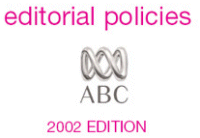ABC Managing Director Mark Scott has announced changes to the ABC’s Editorial Polices, signalling an effort to be more balanced across all programming, not just news and current affairs.
The announcement was made yesterday in a presentation to ABC staff across the country and detailed later in an address to the conservative Sydney Institute think-tank. The announcement happens in a week where another strike by ABC staff over pay and conditions is expected.
ABC critics have welcomed the new policies for their insistence on balancing sources, while ABC supporters feel there is no reason to impose tougher guidelines because there is no wave of public dissatisfaction with ABC programming.
Mark Scott says it is “vital that the ABC set higher standards for itself than any other media organisation in Australia.”
“The revised editorial policies are the most significant statement of values the ABC has made in over twenty years, giving greater emphasis to the need for impartiality in the ABC’s coverage of contentious matters… The policies will ensure that ABC audiences can see and hear a broad range of viewpoints on matters of importance. ”
The three key areas of change will be:
1. ABC Editorial Policies now require the ABC to be able to demonstrate impartiality at the platform level (i.e. the individual television or radio network, or on ABC Online) for opinion, topical and factual content. This means the ABC must provide its audiences a range of different perspectives on the subject under consideration.
2. A new content category called Opinion is being recognised within ABC content for the first time. This is content presented from a particular point of view about a matter of public contention. This content will be signposted and the requirement for impartiality will mean a range of views must be presented over time.
3. A new position, Director of ABC Editorial Polices will be created to report to the Managing Director in his role as Editor-in-Chief to provide independent assessment of editorial performance.
The policies will apply to programming over four content categories: news and current affairs, topical and factual, opinion and performance.
During a report on ABC Radio’s PM program, Scott said: “In some ways, I understand policies like these can be seen as a massive rod for our own backs, a weapon our critics can beat us with. More grounds for more questions at Senate estimates but a very important one for an ABC that takes its reputation for fairness, accuracy, balance and objectivity seriously.”
The program quotes ABC critic David Flint welcoming the new policies: “I think people would be delighted. Critics should be delighted. There is a view that the ABC should be sold, I think it would stave off that criticism and I think that a lot of critics would be satisfied to see the application of editorial guidelines.”
But ABC supporter and former Media Watch presenter David Marr told the program: “I read them and I wonder who are these for? They’re not for the public. The public votes the ABC one of the most trusted and respected institutions in the Country. The public does not believe the ABC is partial. The public does not believe the line that the ABC is captured by the left…
”It’s not going to silence the critics. Anybody who believes this new and complicated framework is going to silence the critics is deluded… It looks to me like a charter for a more cautious ABC.”
Sydney Institute director and ABC Critic Gerard Henderson, in a Sydney Morning Herald opinion piece today wrote:
“As demonstrated in his speech last night, the newly appointed ABC managing director, Mark Scott, does intend to be the editor-in-chief… Yesterday Scott released a document titled An Introduction to the Editorial Policies 2007, which he described as the most significant public statement of values made by an ABC Board in over 21 years… If implemented according to plan, it will introduce the most comprehensive reform within the public broadcaster in decades.”
Some ABC staff are concerned that the new policies will make broadcasters less fearless in their ability to investigate and present controversial stories, and that it will open the floodgates for vexatious complaints or force minority viewpoints to be given the same weight as all other elements in a story. Many are also concerned that they will give the government more avenues to be able to interfere in editorial decisions.
The new guidelines will come into force next year. The current ABC Editorial Policies were last published in 2002 and were updated incrementally in July 2004, February 2005 and June 2005. Click below to see the current policy document.

